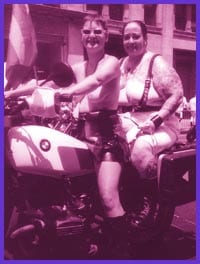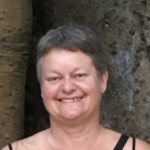Women have had the legal right to go topless in Ontario since late 1996, when the Ontario appeal court overturned Gwen Jacobs’s conviction for indecency. She was ticketed by Guelph police five years earlier for going topless on a 33-degree Celsius day.
But that victory hasn’t meant Ontario women feel safe or comfortable exercising their right to go topless. The Jacobs ruling seems to have had little effect, and I’ve often found myself alone in publicly enjoying the feel of sun on my naked breasts. Surprisingly, a lot of the grief I’ve been given has come from other women, including lesbians.
In 1998, I marched bare-breasted for Pride. I was reprimanded by my building superintendent, a 60-year-old woman who insisted that I have a shirt on by the next time she saw me. (I did not.) Later that day while walking down Gloucester, a woman looked down her nose at me and said my naked breasts were disgusting and should be covered up.
The same summer, canoeing in Algonquin Park, a man I met by chance at a portage berated me for being topless, adding that I had done it “in front of children, no less.” Strangely, he didn’t comment until his canoe was back in the water and he was headed away from me. His own toplessness didn’t seem to be an issue.
Prohibitions against women baring their breasts, so casually accepted, seem to me to be one of the greatest inequalities. Some agree with me. I first encountered similar revolutionary voices at the Michigan Women’s Music Festival where thousands of women wander topless, even naked, through the woods and fields.
Ramona Santorelli from Rochester began the resistance movement in New York state that eventually “liberated” the breasts of women after a court battle there. She sold T-shirts of naked breasts with the slogan Top-Free Equality to raise money. I bought and wore one back in the ’80s.
By the time of Gwen Jacobs’s arrest, I had become more adamant. I was one of three topless women who protested her arrest on Parliament Hill in the summer of ’92. I made the national news and the cover of Frank magazine.
I have always felt people hold power in our chests. But it is mostly men who are allowed to stand bare chested and strong, while women cave in, slouching their shoulders to hide the bounty they carry. I prefer to see women standing tall, shoulders back, breasts forward, feeling strong.
Women’s breasts may be seen as sex objects, but ask anyone who lusts after men if their chests aren’t as sexy. Besides, men can control themselves and do. One of the biggest obstacles now is that women are shy about exposing themselves after a lifetime of having their bodies criticized.
I get strong messages, from unlikely people, that my breasts are unsightly.
This year I rode my motorcycle topless in the NYC Pride Parade. The Sirens women’s motorcycle club organizes the contingent that leads the parade, with other clubs and independent riders following them. When I walked to the head of the parade to take photos, I was asked by the group’s marshal to not take pictures of club members, because they didn’t want the audience to think I was a member. They didn’t want to be associated with me, a topless woman. One club member told me that the group had voted to wear tops to give a good public impression; she said she was the sole dissenting voter.
Two days later a most unscientific survey from the Sirens was mailed to each registered parade rider, including men.
The questions were loaded against toplessness. “On the ride down Fifth Avenue, did you notice the crowd reacting negatively to the topless/semi-nude women riders and passengers? In your opinion, does our gay and lesbian community find topless/semi-nude women riders and passengers a) offensive, b) sensational, c) exhibitionist, d) has no problem with it? Do you think this form of public nudity gives gay and lesbian motorcyclists a bad/poor image?”
Because my passenger and I were the only topless women riders, I felt a personal sting in these questions.
Nowhere did they ask about pride, strength or beauty of women’s naked breasts. The message the Sirens sent is that they would regulate shirts on all women, if they only could.
Aside from Pride, there are only two places in Toronto where I’ve gone topless and felt more or less safe: Hanlan’s Point and Cawthra Square Park. The gay men in both places make me feel protected. Some of them might rather not see my tits, though others encourage me with supportive remarks.
I hope some day, at times other than during Pride, I can casually and comfortably walk down Church St with my 40-year-old tits flopping. Hell, I’d love to sit topless and enjoy a tea at Second Cup.
The truth is, it takes real strength to go out topless on an ordinary day.
You’ve heard about the distinction between wearing an outfit and an outfit wearing you. Walking topless down any street, I have to be prepared for my breasts to wear me.


 Why you can trust Xtra
Why you can trust Xtra


